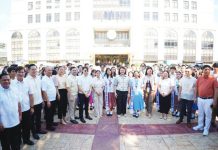
ILOILO City – Calls for full transparency in this city’s infrastructure projects intensified as governance advocates and economists slammed what they described as “selective transparency” and misuse of data privacy laws to withhold public documents.
The issue took center stage during the Anti-Corruption Forum held on October 18 at the University of the Philippines Visayas (UPV), where former Kabataan party-list representative Raoul Manuel, a resident of Iloilo City, and UP Diliman economics professor Dr. Cielo Magno challenged the local government to make public all records involving the use of taxpayers’ money.
“It’s backward that the reason given for denying media access to documents is data privacy,” said Manuel. “Public funds belong to the people, so all documents related to their use should be accessible not only to journalists but also to ordinary citizens. Transparency must not just be a slogan — it should be a practice.”
He explained that data privacy laws are designed to protect personal information, not to conceal government transactions from scrutiny.
“When we talk about good governance, it’s not enough to declare that we are against corruption, we must prove it through our actions,” he added. “If the city government truly believes in accountability, it should have no problem opening its books to the public. This is people’s money, not the politicians’ money.”
Manuel also criticized what he described as “selective transparency”, saying that access to project details often depends on political alignments.
“What we’ve noticed is that the projects chosen for public disclosure or investigation often depend on political affiliations,” he said. “If we are serious about promoting good governance, honesty and transparency should apply to everyone — whether they are allies or critics.”
Meanwhile, Professor Magno, a former Finance Undersecretary and a staunch advocate of fiscal openness, reinforced the call for disclosure, stressing that access to government information is a fundamental democratic right.
“All government information is public information,” she asserted. “The local government cannot invoke data privacy to conceal public contracts. Citizens have the right to know how much was spent, what was built, and whether those projects were worth their taxes.”
Magno underscored that transparency not only builds trust but also empowers citizens to actively participate in governance.
“Transparency is not just about releasing data, it’s about empowering the people,” she said. “When citizens understand where their money goes, they become active participants in governance, not mere observers. That’s how we cultivate a culture of accountability.”
She further pointed out that openness serves as a deterrent to corruption.
“If the public can easily access contracts, budget allocations, and bidding results, it becomes much harder for anyone to manipulate the system,” Magno explained. “Sunlight is the best disinfectant and that’s what transparency provides.”
The forum, organized by UP Visayas, also featured former Commission on Audit (COA) commissioner Heidi Mendoza, who stressed the vital role of citizen vigilance in promoting ethical leadership.
The event came amid mounting public clamor for the city government to release documents on infrastructure projects, amid growing skepticism about accountability in project implementation.
Manuel said, “The people of Iloilo deserve to know where every peso goes. If we truly call ourselves the ‘City of Love,’ then let’s show that love through honesty, transparency, and accountability.”/PN





